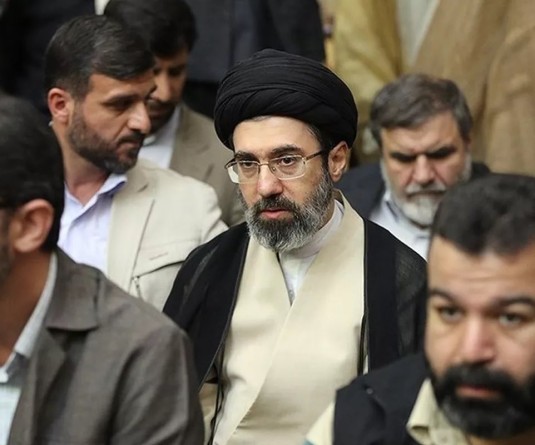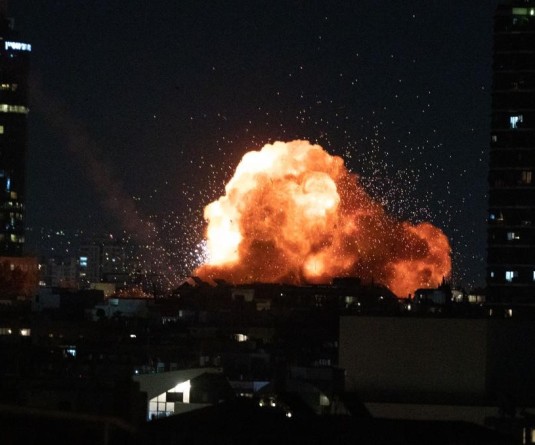
In this photo taken Thursday, June 2, 2011, Bosnian Muslim Mevludin Oric says a prayer in front of the grave of his brother Sejdalija Oric at the Potocari memorial center near Srebrenica. Oric, a Bosnian Muslim soldier captured by Serbs as he fled through the woods, is one of four men known to have survived the Srebrenica massacre. Oric lay for nine hours in the Srebrenica killing field where Bosnian Serb commander Ratko Mladic’s troops executed 8,000 Muslim men and boys in July 1995. On Thursday, Oric returned for the first time to the execution ground with Associated Press journalists to share his feelings about the capture of the man who orchestrated Europe’s worst carnage since World War II. (AP Photo)
SREBRENICA, June 3 (AP): The hardest part was the ants. They crawled over his arms and legs, over his face and into his mouth, hour by hour as he pretended to be dead in a pile of corpses slowly turning stiff. Mevludin Oric lay for nine hours in one of the Srebrenica killing fields where Bosnian Serb commander Ratko Mladic's troops executed 8,000 Muslim men and boys in July 1995. He escaped in the dead of night, after the soldiers had satisfied themselves that everyone in the sea of bodies was dead.
On Thursday, Oric returned for the first time to the execution ground — a pretty V-shaped meadow surrounded by a forest — with Associated Press journalists to share his feelings about the capture of the man who orchestrated Europe's worst carnage since World War II. He brought his eldest daughter, 17-year-old Merima. He wanted her to know what happened here — he wants everyone to know, vowing to testify against Mladic at the U.N. war crimes tribunal in the Hague, Netherlands.
"I can't wait to look into the eyes of that animal," said the lanky 42-year-old, his eyes lighting up after a morning spent on the verge of tears. Serbia extradited Mladic to the Netherlands on Tuesday to face genocide charges; he was arrested last week in a village north of Belgrade after 16 years on the run. Oric, a Bosnian Muslim soldier captured by Serbs as he fled through the woods, is one of four men known to have survived the Srebrenica massacre. All endured the unspeakable ordeal of playing dead while Serb troops patrolled the blood-soaked field, finishing off anybody who showed signs of life with a pistol shot to the head.
Ants bit Oric as they prowled his body, but he didn't dare move. Nearby, an old man begged for his life: "Children, we didn't do anything. Don't do this to us." He, too, was shot. On top of Oric was his dead cousin Hars. In the execution line, Hars took Oric's hand and whispered: "They'll kill us all." When the gunfire erupted, Oric threw himself to the ground, as Hars fell over him, groaning in agony. At one point, Oric saw a Serb soldier walk in his direction. The soldier paused to shoot a man in the head, then continued walking toward Oric. It's my turn, he thought.
"I closed my eyes," Oric said, looking at Merima, "and I thought about you and your mother. And for a few seconds before the expected shot, I wondered what it is like in heaven, or in hell." The shot never came. But it would be hours more before Oric would be free. As he toured the meadow Thursday, Oric deciphered its grim geography: "This is where I lay... This is where the pit was..." "This here is soaked with blood," he said. "I should have been here. But destiny..." His voice trailed off. "I would like to cry," said the construction worker, who lives with his mother and three daughters in central Bosnia. "But there's something in my throat that doesn't allow me to cry."
Close to midnight, the shooting stopped and the Serbs left. Oric's arms and legs were numb, but he managed to shake off his cousin's body and stand up. Moonlight shone over the field of bodies; he saw a shadow approach. "It was the shadow of a man like a ghost" he said. "First I thought it was a soldier left to stand guard." But it was Hurem Suljic, a Bosnian Muslim bricklayer with a bum leg who had also survived. Suljic got closer and asked, "Are you wounded?" Oric said no. Looking around, they saw others still alive but destined to die from rifle wounds. One man had a gash in his side exposing his kidney. "Can you give me a jacket?" he pleaded, "I'm cold." Oric took a jacket from a dead man and gave it to him.
Oric saw another man crawling on his arms, dragging behind his bullet-riddled legs. "Run, brother," the man said. "Don't mind me. I won't make it." Oric and Suljic stepped over corpses and headed into the forest. The journey was hard because of Suljic's bad leg. At times, Oric said, he had to carry the older man on his back. Four days later, they crossed a mine field at the front line and were met by Bosnian soldiers. Before the trip back to Srebrenica, Oric took Merima to the school gymnasium where he and hundreds of other Bosnian Muslim captives had been held by Serb forces before the massacre.
Oric said Mladic was there too on that day, inspecting the prisoners minutes before they were loaded onto trucks and driven to the execution ground. Suljic has given similar testimony. In the school gym, the Muslim men were told they would be part of a prisoner swap. But the men had doubts because they heard gunfire all around. As Oric and his daughter toured the grounds, people in surrounding houses in the Serb-dominated area called out. "Let Mladic go!" they yelled.
On Thursday, Oric returned for the first time to the execution ground — a pretty V-shaped meadow surrounded by a forest — with Associated Press journalists to share his feelings about the capture of the man who orchestrated Europe's worst carnage since World War II. He brought his eldest daughter, 17-year-old Merima. He wanted her to know what happened here — he wants everyone to know, vowing to testify against Mladic at the U.N. war crimes tribunal in the Hague, Netherlands.
"I can't wait to look into the eyes of that animal," said the lanky 42-year-old, his eyes lighting up after a morning spent on the verge of tears. Serbia extradited Mladic to the Netherlands on Tuesday to face genocide charges; he was arrested last week in a village north of Belgrade after 16 years on the run. Oric, a Bosnian Muslim soldier captured by Serbs as he fled through the woods, is one of four men known to have survived the Srebrenica massacre. All endured the unspeakable ordeal of playing dead while Serb troops patrolled the blood-soaked field, finishing off anybody who showed signs of life with a pistol shot to the head.
Ants bit Oric as they prowled his body, but he didn't dare move. Nearby, an old man begged for his life: "Children, we didn't do anything. Don't do this to us." He, too, was shot. On top of Oric was his dead cousin Hars. In the execution line, Hars took Oric's hand and whispered: "They'll kill us all." When the gunfire erupted, Oric threw himself to the ground, as Hars fell over him, groaning in agony. At one point, Oric saw a Serb soldier walk in his direction. The soldier paused to shoot a man in the head, then continued walking toward Oric. It's my turn, he thought.
"I closed my eyes," Oric said, looking at Merima, "and I thought about you and your mother. And for a few seconds before the expected shot, I wondered what it is like in heaven, or in hell." The shot never came. But it would be hours more before Oric would be free. As he toured the meadow Thursday, Oric deciphered its grim geography: "This is where I lay... This is where the pit was..." "This here is soaked with blood," he said. "I should have been here. But destiny..." His voice trailed off. "I would like to cry," said the construction worker, who lives with his mother and three daughters in central Bosnia. "But there's something in my throat that doesn't allow me to cry."
Close to midnight, the shooting stopped and the Serbs left. Oric's arms and legs were numb, but he managed to shake off his cousin's body and stand up. Moonlight shone over the field of bodies; he saw a shadow approach. "It was the shadow of a man like a ghost" he said. "First I thought it was a soldier left to stand guard." But it was Hurem Suljic, a Bosnian Muslim bricklayer with a bum leg who had also survived. Suljic got closer and asked, "Are you wounded?" Oric said no. Looking around, they saw others still alive but destined to die from rifle wounds. One man had a gash in his side exposing his kidney. "Can you give me a jacket?" he pleaded, "I'm cold." Oric took a jacket from a dead man and gave it to him.
Oric saw another man crawling on his arms, dragging behind his bullet-riddled legs. "Run, brother," the man said. "Don't mind me. I won't make it." Oric and Suljic stepped over corpses and headed into the forest. The journey was hard because of Suljic's bad leg. At times, Oric said, he had to carry the older man on his back. Four days later, they crossed a mine field at the front line and were met by Bosnian soldiers. Before the trip back to Srebrenica, Oric took Merima to the school gymnasium where he and hundreds of other Bosnian Muslim captives had been held by Serb forces before the massacre.
Oric said Mladic was there too on that day, inspecting the prisoners minutes before they were loaded onto trucks and driven to the execution ground. Suljic has given similar testimony. In the school gym, the Muslim men were told they would be part of a prisoner swap. But the men had doubts because they heard gunfire all around. As Oric and his daughter toured the grounds, people in surrounding houses in the Serb-dominated area called out. "Let Mladic go!" they yelled.
Mladic refuses to enter pleas
THE HAGUE, June 3 (AP): Ratko Mladic defiantly refused on Friday to enter pleas to what he called "obnoxious" allegations that as the Serb military chief during the Bosnian war he orchestrated the worst atrocities of a conflict that claimed 100,000 lives. He claimed he was defending "my people and my country." Appearing in a U.N. courtroom shielded by bulletproof glass 16 years after he was first indicted, Mladic told the Dutch presiding judge he was "gravely ill," but would only give details of his health out of earshot of the public.
However, the ravages of time and his life as a fugitive were clear for the dozens of war survivors, diplomats and journalists watching the 69-year-old general from the Yugoslav war crimes tribunal's public gallery. Mladic appeared unable to fully use his right hand. Court guards supported him as he stood up and helped him put on a headset so he could listen to a simultaneous translation of the hearing in Serbian. His head was almost entirely bald after he removed a baseball cap he wore when he entered court and his speech was slow and appeared slightly slurred.
His family said after his arrest last week that he had suffered two strokes while on the run from an indictment for genocide and war crimes committed in the 1992-95 Bosnian war, including ethnic cleansing purges of non-Serbs, the shelling and sniping campaign that terrorized Sarajevo for four years, and the 1995 massacre of 8,000 Muslim men and boys in Srebrenica. But Mladic had lost none of the bluster he demonstrated while commanding Serb forces accused of unspeakable atrocities throughout the 1992-95 Bosnian war.
He saluted with his left hand to the public gallery and gruffly told Presiding Judge Alphons Orie he did not want "a single letter or sentence" of his indictment read in court. When asked by Orie if he wanted to enter pleas to the indictment, Mladic replied that he did not want to respond to the "obnoxious charges" and "monstrous words." "I am Gen. Mladic and the whole world knows who I am," he declared at the end of the hearing that lasted one hour and 40 minutes.
Orie scheduled a new hearing for July 4. If Mladic again refuses to plead to the 11 charges, including genocide and crimes against humanity, judges will file "not guilty" pleas on his behalf and preparations will begin in earnest for a trial expected to last years. Mladic's arraignment, his first public appearance since he went into hiding nearly 16 years ago, was aired live in Serbia, where viewers appeared mostly indifferent, or curious to see what Mladic looked like after all these years.
Borko Jancic, from Belgrade, said Mladic looked old and frail, and that "the whole situation is really sad. I can't believe that they forced him to stand the trial now." Dragan Tosic, who also watched in a Belgrade cafe, said "he looks a bit nervous, which is normal after all these years in hiding." "But, I think he looks pretty good, considering the whole situation," Tosic added. "This should have happened a long time ago." Law expert Vesna Rakic Vodinelic said Serbs, like most people in the Balkans, view their war crimes suspects with mixed feelings that range from indifference to a sense of injustice, but also shame.
However, the ravages of time and his life as a fugitive were clear for the dozens of war survivors, diplomats and journalists watching the 69-year-old general from the Yugoslav war crimes tribunal's public gallery. Mladic appeared unable to fully use his right hand. Court guards supported him as he stood up and helped him put on a headset so he could listen to a simultaneous translation of the hearing in Serbian. His head was almost entirely bald after he removed a baseball cap he wore when he entered court and his speech was slow and appeared slightly slurred.
His family said after his arrest last week that he had suffered two strokes while on the run from an indictment for genocide and war crimes committed in the 1992-95 Bosnian war, including ethnic cleansing purges of non-Serbs, the shelling and sniping campaign that terrorized Sarajevo for four years, and the 1995 massacre of 8,000 Muslim men and boys in Srebrenica. But Mladic had lost none of the bluster he demonstrated while commanding Serb forces accused of unspeakable atrocities throughout the 1992-95 Bosnian war.
He saluted with his left hand to the public gallery and gruffly told Presiding Judge Alphons Orie he did not want "a single letter or sentence" of his indictment read in court. When asked by Orie if he wanted to enter pleas to the indictment, Mladic replied that he did not want to respond to the "obnoxious charges" and "monstrous words." "I am Gen. Mladic and the whole world knows who I am," he declared at the end of the hearing that lasted one hour and 40 minutes.
Orie scheduled a new hearing for July 4. If Mladic again refuses to plead to the 11 charges, including genocide and crimes against humanity, judges will file "not guilty" pleas on his behalf and preparations will begin in earnest for a trial expected to last years. Mladic's arraignment, his first public appearance since he went into hiding nearly 16 years ago, was aired live in Serbia, where viewers appeared mostly indifferent, or curious to see what Mladic looked like after all these years.
Borko Jancic, from Belgrade, said Mladic looked old and frail, and that "the whole situation is really sad. I can't believe that they forced him to stand the trial now." Dragan Tosic, who also watched in a Belgrade cafe, said "he looks a bit nervous, which is normal after all these years in hiding." "But, I think he looks pretty good, considering the whole situation," Tosic added. "This should have happened a long time ago." Law expert Vesna Rakic Vodinelic said Serbs, like most people in the Balkans, view their war crimes suspects with mixed feelings that range from indifference to a sense of injustice, but also shame.






